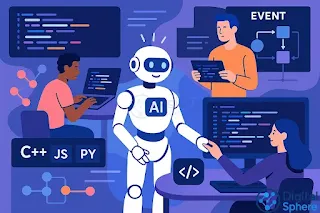As programming accelerates in 2025, we’re leading the transformation. With rapid shifts in user expectations, development environments, and cross-platform demands, developers are being challenged to rethink not just what they code, but how they approach it. Welcome to the era of next-generation programming paradigms.
1. Event-Driven Everything
In the past, event-driven programming was mostly associated with UI interactions or backend webhooks. Now, it's everywhere. With the explosion of IoT, microservices, and real-time data processing, modern software is increasingly built to respond to asynchronous events across complex systems.
Frameworks in 2025 are now optimized to handle distributed event streams, integrating tools like Kafka, NATS, and even decentralized event brokers. Programmers are embracing reactive systems not just for efficiency, but for reliability in high-load scenarios.
2. Intent-Based Programming
One of the most intriguing shifts is toward intent-based programming—an evolution that allows developers to describe what they want the system to achieve rather than how to do it. Powered by AI-assisted compilers and code generators, this approach is redefining how logic is implemented.
For example, instead of manually writing filtering and sorting functions, developers describe the intended behavior, and the system intelligently generates optimized routines, sometimes even adapting them during runtime based on user behavior or system state.
3. Language-Agnostic Toolchains
Forget language wars. In 2025, programming ecosystems are becoming increasingly language-agnostic. Thanks to WASM (WebAssembly), serverless platforms, and polyglot containerization, developers can mix and match languages based on the best tool for the job.
A single application might have performance-critical modules in Rust, business logic in Kotlin, and scripting in Python without friction. Gone are the days of monolithic stacks our modern toolchains embrace openness, automation, and cross-platform support.
4. Security-First Code Design
Security is no longer a feature—it’s a foundation. Programming paradigms now include security principles by default. Whether it’s through memory-safe languages, sandboxed execution environments, or immutable infrastructure-as-code, developers are expected to embed security early and everywhere.
New frameworks automatically handle secure data handling, prevent injection attacks, and enforce least-privilege access models without requiring extra configuration. In 2025, writing insecure code isn’t just frowned upon—it’s nearly impossible with the tools at hand.
5. Human-AI Co-Coding
AI isn’t just suggesting code snippets anymore—it’s acting as a creative coding partner. Developers are collaborating with advanced AI agents that understand architectural goals, refactor entire modules, and even predict bugs before they happen.
But the relationship isn’t passive. Developers are shifting roles from sole creators to strategic engineers—guiding, auditing, and optimizing what AI generates. Think of it as pairing with an ultra-fast, context-aware junior dev who never sleeps.
6. Functional Thinking Over Functional Languages
While purely functional languages like Haskell remain niche, the mindset behind functional programming—immutability, pure functions, and statelessness—is now embedded in most mainstream languages. Developers are applying these concepts to write cleaner, more maintainable code, regardless of the syntax.
From JavaScript to Swift, functional programming is no longer something you "switch to"—it’s something you incorporate.
Conclusion
Programming in 2025 is no longer defined by the language you choose or the framework you master. It's defined by how adaptable, secure, and intelligent your development process is. The next-gen developer isn’t just a coder—they’re a system architect, a collaborator with AI, and a strategic thinker building systems that think with them. The future of code is here, and it’s more expressive, dynamic, and inclusive than ever before.
